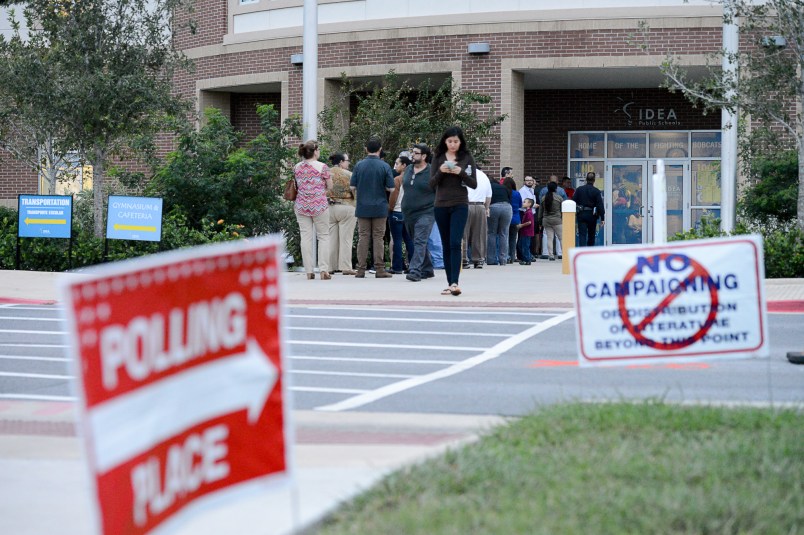North Carolina Democratic Gov. Roy Cooper, who narrowly unseated Republican Pat McCrory in November, announced Tuesday that he is reversing course in a major voting rights case before the U.S. Supreme Court.
The state will no longer defend a series of voting restrictions passed in 2013 by the GOP-controlled legislature and signed by McCrory that a federal appeals court has ruled constitute unconstitutional “race-based vote suppression.”
Since 2013, the state has fought to implement a law that eliminated same-day voter registration, cut a full week of early voting, barred voters from casting a ballot outside their home precincts, scrapped straight-ticket voting, and got rid of a program to pre-register high school students who would turn 18 by Election Day. That law also included one of the nation’s strictest voter ID requirements.
The NAACP sued the state, and the 4th Circuit Court of Appeals agreed with the civil rights group in a blistering ruling last July, holding that Republican lawmakers set out to suppress African-American voters “with almost surgical precision.”
In striking down the law as unconstitutional, the court noted that the legislators first studied which demographic groups used which voting methods, and then moved to eliminate those favored by black residents. The law was a perfect example, the court noted, of “the inevitable tendency of elected officials to entrench themselves by targeting groups unlikely to vote for them.”
Before he lost his re-election bid, McCrory had appealed the ruling to the U.S. Supreme Court, seeking to overturn the 4th Circuit’s decision. Now, Cooper is reversing the state’s position and seeking to withdraw the petition for the high court to review the case. He also announced that he is dismissing the private attorneys the state had been paying to defend the law, an effort that cost nearly $5 million in taxpayer dollars.
“We need to make it easier for people to exercise their right to vote, not harder, and I will not continue to waste time and money appealing this unconstitutional law,” Cooper said in a press release on Tuesday. “It’s time for North Carolina to stop fighting for this unfair, unconstitutional law and work instead to improve equal access for voters.”
The state’s new Democratic Attorney General Josh Stein, who like Cooper beat his Republican opponent by a narrow margin in November, added that the move will save the state a great deal of money going forward.
“Attorneys representing the plaintiffs have agreed to waive up to $12 million of legal fees from the more than three-year litigation if the petition is dismissed and the litigation ends,” he said in his own statement on the matter.
The Supreme Court is scheduled to consider taking up the voting rights case at its March 3 conference.
The case, however, may not be completely dead.
Though the Governor’s Office and the state’s Justice Department have withdrawn their petition, the State Board of Elections remains an active party in the case. Election law professor Rick Hasen notes that the board and its individual members—some of whom are Republican—may be able to keep hiring outside counsel to defend the voting restrictions.
This twist comes amid a separate court battle for control of the state Elections Board. While the new governor would normally appoint a majority of the board’s members, Republicans in the legislature passed a bill of questionable legality to strip him of that power just before he took office.







As long as they’re willing to pay for outside counsel from their own pockets, I say let 'em go for it.
They will charge the tax payers and probably get paid as well.
Elections have consequences. In this case, good ones.
Whenever I read about voter restrictions, I think fondly of the men and women fighting overseas to preserve our way of life.
This will give Art Pope a sad, which makes me happy. Stop voter suppression, it’s unconstitutional and unAmerican! (Actually, it’s historically American, but it needs to stop. I’m finishing up reading a great biography of U.S. Grant, who fought the KKK in the 19th century. You would think we have learned by now, but apparently history repeats itself.)